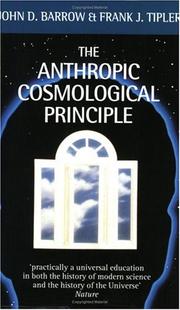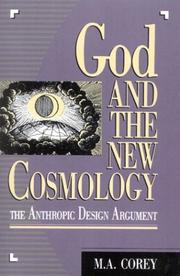| Listing 1 - 8 of 8 |
Sort by
|
Book
ISBN: 0391036947 9780391036949 Year: 1991 Publisher: Atlantic Highlands (New Jersey): Humanities press international,
Abstract | Keywords | Export | Availability | Bookmark
 Loading...
Loading...Choose an application
- Reference Manager
- EndNote
- RefWorks (Direct export to RefWorks)
Anthropic principle --- Evolution --- Human beings --- Man --- Homo sapiens --- Human race --- Humanity (Human beings) --- Humankind --- Humans --- Mankind --- People --- Hominids --- Persons --- Philosophy --- Creation --- Emergence (Philosophy) --- Teleology --- Anthropic cosmological principle --- Cosmology --- Anthropic principle. --- Evolution. --- Human beings.

ISBN: 0203953460 113671099X 1136710973 9781136710995 9780203953464 0415938589 9780415938587 9781136711008 1136711007 9781136710957 1136710957 0415938589 9780415938587 0415883946 9780415883948 9781136710971 Year: 2002 Publisher: New York, N.Y. Routledge
Abstract | Keywords | Export | Availability | Bookmark
 Loading...
Loading...Choose an application
- Reference Manager
- EndNote
- RefWorks (Direct export to RefWorks)
Methodology. --- Anthropic principle. --- Selectivity (Psychology) --- Observation (Scientific method) --- Anthropic cosmological principle --- Cosmology --- Teleology --- Philosophy --- Research --- Attention, Selective --- Selective attention --- Selective perception --- Cognition --- Human information processing --- Perception --- Science --- Methodology --- Metaphysics --- Humanities Methodology
Book
ISBN: 0198519494 9780198519492 Year: 1986 Publisher: Oxford: Clarendon,
Abstract | Keywords | Export | Availability | Bookmark
 Loading...
Loading...Choose an application
- Reference Manager
- EndNote
- RefWorks (Direct export to RefWorks)
Anthropic principle --- Extraterrestrial life --- Fermi's paradox --- Human intelligence --- Mental retardation --- Homo sapiens --- Human race --- Humanity (Human beings) --- Humankind --- Humans --- Mankind --- People --- Hominids --- Anthropic cosmological principle --- Human beings --- Intellect --- Life on other planets --- Science --- Planets --- Intelligence --- Mind --- Ability --- Psychology --- Thought and thinking --- Man --- Persons --- Cosmology --- Teleology --- Normal science --- Philosophy of science --- Philosophy --- Philosophy of nature --- Philosophical anthropology --- Intellect. --- Science - Philosophy
Book
ISBN: 0124199798 0124199631 9780124199798 9780124199637 Year: 2015 Publisher: Amsterdam : Elsevier,
Abstract | Keywords | Export | Availability | Bookmark
 Loading...
Loading...Choose an application
- Reference Manager
- EndNote
- RefWorks (Direct export to RefWorks)
Anthropic Awareness: The Human Aspects of Scientific Thinking in NMR Spectroscopy and Mass Spectrometry blends psychology, philosophy, physics, mathematics, and chemistry, describing a human-centered philosophy of the essence of scientific thinking in the natural sciences and in everyday life. It addresses the reasons why we are prone to make errors in our conclusions and how to avoid such mistakes, also exploring a number of the ""mental traps"" that can lead to both individual mistakes and mass misconceptions. The book advocates that by understanding the nature of these mental traps we
Physical Sciences & Mathematics --- Sciences - General --- Science --- Thought and thinking. --- Nuclear magnetic resonance spectroscopy. --- Mass spectrometry. --- Anthropic principle. --- Philosophy. --- Anthropic cosmological principle --- Cosmology --- Teleology --- Mass spectra --- Mass spectrograph --- Mass spectroscopy --- Mass spectrum analysis --- Mass (Physics) --- Nuclear spectroscopy --- Spectrum analysis --- NMR spectroscopy --- Spectroscopy, NMR --- Spectroscopy, Nuclear magnetic resonance --- Knight shift --- Mind --- Thinking --- Thoughts --- Educational psychology --- Philosophy --- Psychology --- Intellect --- Logic --- Perception --- Psycholinguistics --- Self --- Normal science --- Philosophy of science
Book
ISBN: 9789004465954 9789004468344 9004465952 900446834X Year: 2021 Volume: 170 Publisher: Leiden: Brill,
Abstract | Keywords | Export | Availability | Bookmark
 Loading...
Loading...Choose an application
- Reference Manager
- EndNote
- RefWorks (Direct export to RefWorks)
In this volume, Costache endeavours to map the world as it was understood and experienced by the early Christians. Progressing from initial fears, they came to adopt a more positive view of the world through successive shifts of perception. This did not happen overnight. Tracing these shifts, Costache considers the world of the early Christians through an interdisciplinary lens, revealing its meaningful complexity. He demonstrates that the early Christian worldview developed at the nexus of several perspectives. What facilitated this process was above all the experience of contemplating nature. When accompanied by genuine personal transformation, natural contemplation fostered the theological interpretation of the world as it had been known to the ancients.
Nature --- Cosmology, Ancient. --- Anthropic principle. --- Theology --- Religion and science --- Religious aspects --- Christianity --- History of doctrines --- History --- History. --- Bible --- History of Biblical events --- Cosmology, Ancient --- Anthropic principle --- 241.1*1 --- 241.1*1 Theologische ethiek: daden tegenover de cosmos --- Theologische ethiek: daden tegenover de cosmos --- Anthropic cosmological principle --- Cosmology --- Teleology --- Ancient cosmology --- History of controversy --- Nature - Religious aspects - Christianity - History of doctrines - Early church, ca. 30-600. --- Theology - History - Early church, ca. 30-600. --- Religion and science - History. --- Christianity.

ISBN: 0192821474 9780192821478 Year: 1994 Publisher: Oxford: Oxford university press,
Abstract | Keywords | Export | Availability | Bookmark
 Loading...
Loading...Choose an application
- Reference Manager
- EndNote
- RefWorks (Direct export to RefWorks)
Anthropic principle --- Intellect --- Life on other planets --- Man --- Science --- -Human beings --- #GROL:SEMI-130.2:6 --- Homo sapiens --- Human race --- Humanity (Human beings) --- Humankind --- Humans --- Mankind --- People --- Hominids --- Persons --- Natural science --- Science of science --- Sciences --- Extraterrestrial life --- Planets --- Fermi's paradox --- Human intelligence --- Intelligence --- Mind --- Ability --- Psychology --- Mental retardation --- Thought and thinking --- Anthropic cosmological principle --- Cosmology --- Teleology --- Philosophy --- Human beings --- Intellect. --- Cosmologie --- Homme --- Finalité --- Vie extraterrestre --- Philosophie --- Normal science --- Philosophy of science --- Philosophy of nature --- Philosophical anthropology --- Anthropic principle. --- Human beings. --- Life on other planets. --- Philosophy. --- Science - Philosophy

ISBN: 0847678024 0847678016 9780847678020 Year: 1993 Publisher: Lanham (Md.): Rowman & Littlefield,
Abstract | Keywords | Export | Availability | Bookmark
 Loading...
Loading...Choose an application
- Reference Manager
- EndNote
- RefWorks (Direct export to RefWorks)
Anthropic principle --- Antropisch beginsel --- Christianisme et science --- Christianisme et sciences --- Christianity and science --- Geology -- Religious aspects --- Geology and religion --- Godsdienst en wetenschap --- Géologie et religion --- Natural religion --- Natural theology --- Natuurlijke religie --- Principe anthropique --- Religion and science --- Religion et science --- Religion et sciences --- Religion et sciences naturelles --- Religion et technologie --- Religion naturelle --- Religions et sciences --- Science -- Religious aspects --- Science and religion --- Science et christianisme --- Science et religion --- Sciences et christianisme --- Sciences et religion --- Sciences et religions --- Sciences naturelles et religion --- Technologie et religion --- Wetenschap en godsdienst --- God --- Anthropic principle. --- Natural theology. --- Proof, Cosmological. --- Proof, Teleological. --- 215 --- 211.1 --- #GROL:SEMI-111.92 --- Godsbewijzen: ontologisch argument; deontologisch argument;--via de wetenschap; via de kunst --- Proof [Cosmological ] --- Proof [Teleological ] --- God - Proof, Cosmological. --- God - Proof, Teleological. --- Anthropic cosmological principle --- Geology --- Science --- Theology, Natural --- Teleological argument --- Cosmological argument --- Proof, Cosmological --- Proof, Teleological --- Religious aspects --- Cosmology --- Teleology --- Apologetics --- Religion --- Theology --- Philosophy of nature --- Intelligent design (Teleology)
Book
ISBN: 0691231362 Year: 2022 Publisher: Princeton, N. J. : Princeton University Press,
Abstract | Keywords | Export | Availability | Bookmark
 Loading...
Loading...Choose an application
- Reference Manager
- EndNote
- RefWorks (Direct export to RefWorks)
From the Nobel Prize–winning physicist, a personal meditation on the quest for objective reality in natural scienceA century ago, thoughtful people questioned how reality could agree with physical theories that keep changing, from a mechanical model of the ether to electric and magnetic fields, and from homogeneous matter to electrons and atoms. Today, concepts like dark matter and dark energy further complicate and enrich the search for objective reality. The Whole Truth is a personal reflection on this ongoing quest by one of the world’s most esteemed cosmologists.What lies at the heart of physical science? What are the foundational ideas that inform and guide the enterprise? Is the concept of objective reality meaningful? If so, do our established physical theories usefully approximate it? P. J. E. Peebles takes on these and other big questions about the nature of science, drawing on a lifetime of experience as a leading physicist and using cosmology as an example. He traces the history of thought about the nature of physical science since Einstein, and succinctly lays out the fundamental working assumptions. Through a careful examination of the general theory of relativity, Einstein’s cosmological principle, and the theory of an expanding universe, Peebles shows the evidence that we are discovering the nature of reality in successive approximations through increasingly demanding scrutiny.A landmark work, The Whole Truth is essential reading for anyone interested in the practice of science.
Cosmology. --- Physics. --- Reality. --- Science --- SCIENCE / Cosmology. --- Philosophy. --- Absolute magnitude. --- Acceleration. --- Angular momentum. --- Approximation. --- Astronomer. --- Astronomy. --- Asymptotically flat spacetime. --- Atomic nucleus. --- Atomic number. --- Baryon. --- Big Bang. --- Calculation. --- Chronology of the universe. --- Classical limit. --- Classical physics. --- Comprehension (logic). --- Conservation law. --- Cosmic Evolution (book). --- Cosmological constant. --- Cosmological principle. --- Density. --- Empirical research. --- Equivalence principle. --- Existence. --- Extrapolation. --- Fred Hoyle. --- Galaxy cluster. --- Galaxy rotation curve. --- General relativity. --- George Gamow. --- Goodness of fit. --- Gravitational acceleration. --- Gravitational redshift. --- Gravity. --- Hubble's law. --- Inverse-square law. --- Jupiter. --- Kinetic energy. --- Kuiper belt. --- Length scale. --- Linear scale. --- Mach's principle. --- Mass distribution. --- Measurement. --- Metric expansion of space. --- Minkowski space. --- Modified Newtonian dynamics. --- Multiple discovery. --- NGC 2403. --- Natural science. --- Neutrino. --- Neutron. --- Newton's law of universal gravitation. --- Number density. --- Observation. --- Order of magnitude. --- Paradigm shift. --- Partial derivative. --- Particle physics in cosmology. --- Peirce (crater). --- Photon. --- Physical cosmology. --- Physical law. --- Physicist. --- Planetary nebula. --- Planetary system. --- Power law. --- Prediction. --- Predictive power. --- Present value. --- Quantum electrodynamics. --- Quantum mechanics. --- Redshift. --- Repeatability. --- Richard Feynman. --- Satellite. --- Scattering. --- Schwarzschild metric. --- Science wars. --- Scientist. --- Sirius. --- Social constructionism. --- Special relativity. --- Spiral galaxy. --- Steady State theory. --- Stellar classification. --- Supersymmetry. --- Temperature. --- Tests of general relativity. --- The Unreasonable Effectiveness of Mathematics in the Natural Sciences. --- Theoretical physics. --- Theory of relativity. --- Theory. --- Thermal radiation. --- Thomas Kuhn. --- Thought. --- Verificationism. --- Wavelength. --- White dwarf. --- Zero-point energy. --- Normal science --- Philosophy of science --- Philosophy --- Truth --- Nominalism --- Pluralism --- Pragmatism --- Natural philosophy --- Philosophy, Natural --- Physical sciences --- Dynamics --- Astronomy --- Deism --- Metaphysics --- SCIENCE / Space Science / Cosmology --- SCIENCE / History
| Listing 1 - 8 of 8 |
Sort by
|

 Search
Search Feedback
Feedback About UniCat
About UniCat  Help
Help News
News